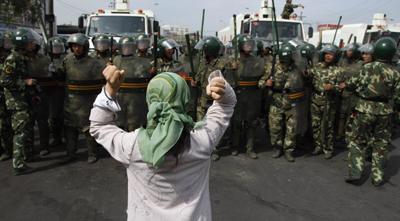For the first time in more than a decade, China is not the world’s worst jailer of the press in CPJ’s annual census of imprisoned journalists. Among the 27 jailed in China, one group has seen a massive jump in imprisonments. In another first since CPJ began taking its census, more than half of those behind bars for reporting in China are ethnic Uighur or Tibetan. What’s more, two Uighur journalists have been unaccounted for since their scheduled 2011 release. The lack of information available about these cases is added proof that they were arrested to deprive their communities of a voice.
The trend dates back to ethnic unrest in the Tibetan and Xinjiang autonomous regions in 2008 and 2009, news of which Chinese authorities censored at the time. “Many Uighur journalists and webmasters were sentenced to harsh prison terms in the last two years,” Dolkun Isa, secretary general of the World Uyghur Congress, told CPJ by email. The total number is hard to confirm. As John Kamm, chair of the prisoner rights group Dui Hua Foundation said in our imprisoned report released today, there could be more as yet undocumented.
MORE ON THIS ISSUE
• Report: Journalist
jailings jump
• Database of all
imprisoned journalists
• Blog: Ethiopia’s abuse
of terror laws
Two Uighur journalists believed to be released from prison in 2011 exemplify the difficulty. The nine-year sentence given to Abdulghani Memetemin for “leaking state secrets” after his 2002 arrest, and Mehbube Ablesh’s three–year term on separatism charges from 2008, both expired this year. After consulting with other human rights groups, CPJ followed the analysis published by the Congressional Executive Commission on China, which presumes they were freed on schedule. But where are they?
“We have tried through different sources and channels to get information on the possible release of Mehbube Ablesh and Abdulghani Memetemin, but there is no news on their whereabouts,” the Germany-based World Uyghur Congress’s Dolkun Isa said.
“There hasn’t been any confirmation [of their status] yet,” Amy Reger, researcher with the Uyghur American Association in Washington D.C., agreed. She pointed out that extrajudicial measures can be used to extend imprisonment or official persecution following the expiration of prison terms in China.
CPJ research shows security officials isolate many dissidents and writers in their homes after their release from official custody. Coverage of high-profile examples such as artist and documentarian Ai Weiwei and blind legal activist Chen Guangcheng continues nonetheless, both internationally and domestically. Their supporters use creative online tools to publicize the men’s situations: Ai’s backers recently stripped and Chen’s wore dark glasses, both then sharing images of themselves on the Internet in a gesture of solidarity that is hard to censor using keyword blocks. But while there are some prominent minority activists, most of these journalists we defend are virtually anonymous outside their own communities.
In cases of minority journalists, Chinese police routinely flout due process rules requiring them to acknowledge the whereabouts of those in detention, CPJ research shows. Most court proceedings are closed to observers. Even when information is available, media access to the Tibetan and Xinjiang regions is heavily controlled, and sources face persecution for speaking to international reporters. Among the crimes that led to Uighur website manager Gheyret Niyaz’s 15-year prison sentence was accepting an interview with a Hong Kong-based magazine.
Some have connections in the outside world who can help publicize their cases. Dhondup Wangchen sent his wife and children out of Tibet to Dharamsala, India, before starting work on a documentary film on Tibetan treatment under Chinese rule, which resulted in his 2008 arrest. Dilixiati Paerhati’s brother Dilimulati lives in England and helped break the news of the website manager’s disappearance. Others behind bars remain unacknowledged.
Through our imprisoned census, CPJ tries to ensure that all imprisoned journalists benefit from international attention and advocacy. The harder it is for us to gather information in these instances, the surer it is that Chinese leaders are sweeping ethnic discord under the rug. We hope that Abdulghani Memetemin and Mehbube Ablesh have been freed, but we will keep monitoring until we are sure. They and their colleagues are not forgotten.
